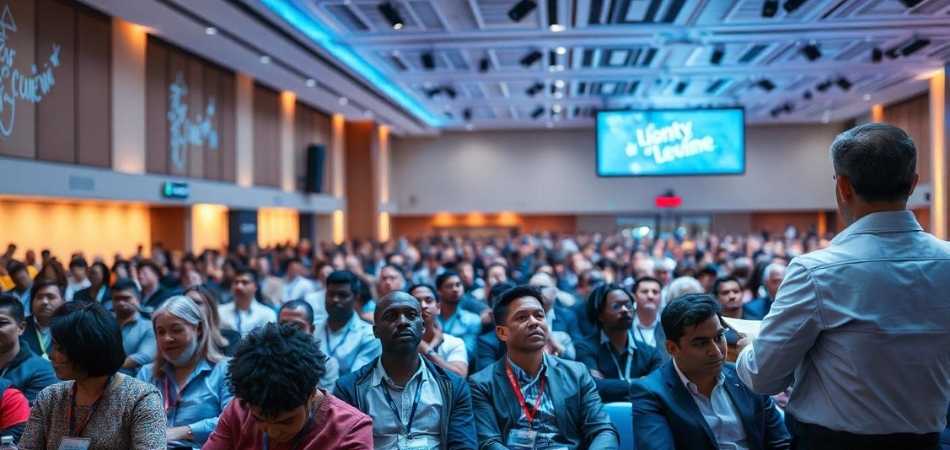International arts conferences serve as vital platforms for creativity and collaboration among artists and professionals. These gatherings often feature diverse participants from various fields within the arts community. If you’re curious about the attendees at these events, you might be wondering, “Who can attend an international arts conference in Canada?”
The attendees typically include artists, art educators, students, curators, and cultural professionals. These conferences are designed to accommodate anyone with a vested interest in the arts, providing a space for sharing ideas and creating connections. Whether you are a seasoned professional or an emerging artist, these conferences welcome you to explore new perspectives and engage with your peers.
Are you intrigued by who might be attending and what that means for your artistic journey? This article will delve deeper into the types of individuals who can attend and what you can expect from these enriching experiences.
What You Need to Know About International Arts Conferences?
Attending an international arts conference can be a transformative experience for artists, scholars, and professionals in the creative sector. These conferences typically bring together individuals from various disciplines to exchange ideas, showcase their work, and discuss emerging trends. You can significantly improve your experience by understanding the purpose and format of these events.
Before attending, it’s essential to research the conference details. Familiarize yourself with the agenda, keynote speakers, and topics to be discussed. This preparation will help you prioritize which sessions to attend and ensure that you make the most of the networking opportunities available.
Moreover, knowing what to expect at the conference is crucial. You’ll engage with a diverse group of attendees, participate in workshops, and gain insights into the latest developments in the arts. Whether you are an established professional or a newcomer, the international arts conference in Canada offers a platform for growth and collaboration in your artistic journey.
Who Can Attend an International Arts Conference in Canada?
Attending an international arts conference in Canada is open to a wide range of individuals. This includes artists, scholars, students, and professionals from various disciplines. Knowing the different types of attendees is essential for grasping the inclusivity of these events.
Artists
Artists play a crucial role in international arts conferences. They can be visual artists, musicians, performers, or writers. Conferences offer a platform for artists to showcase their work and share their creative processes with others. Engaging with fellow artists can lead to collaborations and new creative projects.
Scholars and Researchers
Academics and researchers in the arts are also encouraged to attend. They can present their research findings and engage in discussions about current trends and theories in the arts.
Conferences provide an opportunity for scholars to network with others in their field and establish connections for future collaborations.
Students
Students pursuing degrees in the arts or related fields are welcome at these conferences. Attending can enrich their education and provide real-world insights into the industry. Students can meet professionals and learn about career opportunities available to them after graduation.
Arts Administrators
Arts administrators, such as gallery managers and festival organizers, can benefit greatly from attending these conferences. They can learn about new trends in arts management and network with other professionals. This interaction can lead to improved practices within their organizations.
Educators
Educators teaching art or related subjects can also attend these conferences. They can gain new ideas for their curriculum and teaching methods. Networking with other educators can provide valuable resources for enhancing their teaching practices.
General Public
The general public is often welcome to attend international arts conferences. This inclusivity allows those interested in the arts to learn more about the field and engage with artists and scholars. It creates a community of art enthusiasts who share a passion for creativity.
Eligibility Criteria for Attendees
When considering attending an international arts conference in Canada, there are certain eligibility criteria. These criteria ensure that attendees can benefit from the experience. Here are the key factors to consider.
- Interest in the Arts: Attendees should have a genuine interest in the arts, whether through personal involvement or professional engagement.
- Relevance to Professional Goals: Individuals attending should find relevance in the conference themes and topics to their personal or professional goals.
- Registration Requirements: Most conferences require attendees to register beforehand. This process often involves providing personal information and possibly a payment fee.
- Age Restrictions: Some conferences may have age restrictions for attendees. However, many conferences welcome participants of all ages.
- Academic or Professional Credentials: While not always required, having relevant credentials can enhance the experience at the conference. Artists and scholars may be asked to provide proof of their involvement in the arts.
- Commitment to Engagement: Attendees should be committed to actively participating in sessions, discussions, and networking opportunities. This engagement is crucial for maximizing the conference experience.
A diverse array of individuals can attend an international arts conference in Canada. From artists and scholars to students and the general public, these conferences offer valuable opportunities for all. By understanding the eligibility criteria and purpose of these conferences, attendees can prepare to make the most of their experience.
What Are the Benefits of Attending for Various Attendee Types?
Attending an international arts conference provides unique benefits for different types of attendees. Each group can derive specific advantages from participating in these events. For example, knowing the benefits of attending arts conferences in Canada can help individuals decide to attend and make the most of their experience.
Artists
Artists can gain visibility and recognition through their participation. They can showcase their work to a wider audience and connect with potential collaborators. Networking can lead to future opportunities in exhibitions, grants, or projects.
Scholars and Researchers
For scholars, attending conferences allows them to share their research with peers. This exposure can lead to valuable feedback and collaboration opportunities. Engaging in discussions can help them stay updated on the latest theories and practices.
Students
Students have the chance to learn directly from industry professionals. They can explore career paths and gain insights into the field they are studying. Networking with professionals can also open doors to internships or job opportunities.
Arts Administrators
Arts administrators can learn about new trends in arts management and programming. They can network with other leaders in the field, which can lead to collaborative projects. Attending workshops can provide new tools and strategies for managing their organizations.
Educators
Educators can gain new insights into teaching methods and curriculum development. They can learn about contemporary issues in the arts and bring fresh ideas to their classrooms. Networking with other educators can provide resources for enhancing their teaching practices.
How to Register for an International Arts Conference
Registering for an international arts conference involves several steps to ensure a smooth process. Following these guidelines will help you explore the registration process effectively, allowing you to focus on your upcoming experience at the conference.
Step 1: Visit the Conference Website
Start by visiting the official conference website. Here you will find detailed information about registration procedures, fees, and deadlines. Familiarizing yourself with the site layout will make navigation easier. Make sure to explore all sections, as they may contain valuable information about the conference agenda and speakers.
Step 2: Review Registration Options
Check the various registration options available. Many conferences offer early bird pricing or discounts for students and groups. Selecting the best option can save you money while securing your spot. Consider your schedule and commitments when choosing the most suitable registration type.
Step 3: Complete the Registration Form
Locate the registration section on the website. Fill out the registration form with your personal details, including name, email, and affiliation. Double-check your information for accuracy before submission. This attention to detail will help prevent any potential issues with your registration.
Step 4: Submit Payment
After completing the registration form, you will need to submit payment. Most conferences accept various payment methods, such as credit cards or bank transfers. Keep a copy of your payment confirmation for your records. This confirmation will serve as proof of your registration and may be required for future correspondence.
Step 5: Confirmation of Registration
Once your registration is processed, you should receive a confirmation email. This email will contain essential details about the conference, including your registration status and event schedule. Save this information for future reference. If you do not receive a confirmation, reach out to the organizers to ensure your registration was successful.
Step 6: Prepare for the Conference
With your registration complete, start preparing for the event. Make travel arrangements and gather necessary documents for entry. This preparation will help you maximize your experience at the conference. Additionally, reviewing the agenda will allow you to prioritize sessions and workshops of interest.
Ensure a smooth registration experience by following these steps carefully. It will help you register for an international arts conference efficiently, allowing you to focus on your participation.
What to Expect as an Attendee at the Conference?
One of the most exciting and enriching opportunities is to attend an international arts conference. Knowing what to expect can help you maximize your participation and make the most of your time at the event. Here’s a glimpse of what awaits you.
Engaging Sessions
Expect a variety of engaging sessions, including keynote speeches, panel discussions, and workshops. These sessions will cover a wide range of topics relevant to the arts, featuring experts who will share their insights and experiences. Participating actively can improve your knowledge and provide new perspectives. Additionally, these interactions can spark your creativity and inspire new ideas for your own work.
Networking Opportunities
You will have plenty of opportunities to network with other attendees, including artists, scholars, and industry professionals. This networking can lead to meaningful connections and collaborations that may last well beyond the conference. Be prepared to introduce yourself and engage in conversations, as these connections can open doors to future projects. Don’t hesitate to follow up with contacts after the event to nurture these relationships.
Access to Resources
Attendees often receive materials such as brochures, presentation slides, and access to recorded sessions. These resources can be valuable for future reference and help you retain the knowledge gained during the conference. Take the time to review and utilize these materials post-conference, as they can serve as important tools for your ongoing artistic development.
Frequently Asked Questions (FAQs)
This section addresses some common questions related to attending international arts conferences. Participating in these enriching events can be made easier by understanding these aspects.
What Is the Registration Process for Conferences?
The registration process usually involves filling out an online form, selecting your registration type, and submitting payment. Make sure to review the specific requirements outlined on the conference’s website. Additionally, check for any deadlines to avoid missing out on your chance to attend.
Are There Age Restrictions for Attendees?
Most conferences welcome attendees of all ages, though some may have specific programs customized for students or young professionals. Check the conference guidelines for any age-related details or special sessions available. These programs can provide valuable opportunities for networking and learning.
Can I Get a Discount for Group Registration?
Many conferences offer discounts for group registrations, making it more affordable for teams or organizations to attend together. It’s best to inquire directly with the conference organizers about the specific options available.
What Should I Bring to the Conference?
When attending the conference, bring your registration confirmation, business cards, and any materials needed for note-taking. Comfortable clothing is also recommended to help you feel at ease during sessions and networking events.
How Can I Stay Updated on Future Conferences?
To stay informed about future conferences, subscribe to newsletters from relevant organizations and follow them on social media platforms. This will provide you with timely updates and announcements about upcoming events in the arts sector. Engaging with these organizations can also lead to valuable networking opportunities.
Final Words
Those who are interested in the arts have a unique opportunity to attend an international arts conference. These events bring together a diverse range of participants, including artists, educators, students, and industry professionals. Engaging with fellow attendees can create collaboration, inspire creativity, and expand your perception of various artistic expressions.
So, who can attend an international arts conference in Canada? The answer is that anyone passionate about the arts can participate, whether you are a seasoned professional, a student, or a newcomer to the field. The inclusive nature of these conferences ensures that all voices and perspectives are welcomed, creating a vibrant environment for discussion and innovation.








